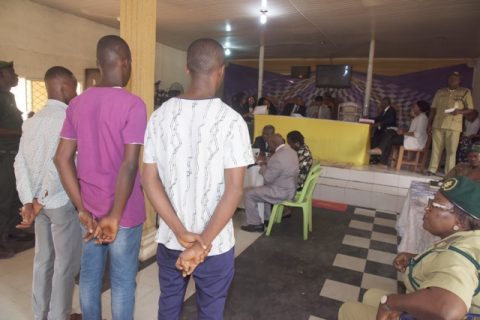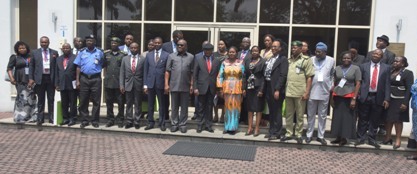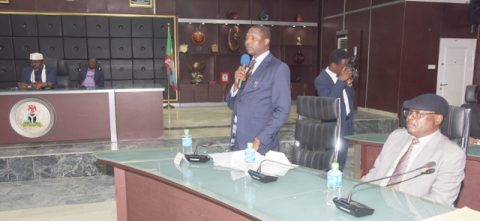


Prison Decongestion: FG Committee Frees 39 Inmates From Rivers, Imo Prisons
…Nursing mother who stole cassava regains freedom
…AGF cautions over rights violation of inmates, 39 set free from Rivers, Owerri prisons
A young nursing mother, Joy Goodluck, an indigene of Imo State who was sentenced to three years jail term in Port Harcourt prison for stealing a half bag of cassava has regained her freedom.
Goodluck was released on the order of the Chairman, National Stakeholders Committee on the Prison Reform and Decongestion who is also Chief Judge of the Federal Capital Territory High Court, Justice Usman Bello Ishaq.
The lady who was a month pregnant at the time of the offense was set free with her baby after she narrated the circumstance that took her to the prison.
Also, the Attorney General of the Federation and Minister of Justice, Abubakar Malami (SAN) has cautioned that since awaiting trial inmates constitute 70 per cent of the nation’s prison population, there is urgent need to address the issue of rights violation in the name of awaiting trial.
Comrade Salihu Othman Isah, Special Adviser to the Attorney General of the Federation and Minister of Justice who disclosed this in a statement said Malami made this known when he led the National Stakeholders Committee on Prison Decongestion to Rivers and Imo States respectively on Monday 5th-Tuesday 6th February, 2018.
The AGF decried the unchecked violation of fundamental rights of prison inmates across the country, explaining that the purpose of the visit was to oversee the implementation of the Federal Executive Council’s directive in fast tracking the decongestion of prisons.
According to him, the Committee would also review cases of inmates who have been convicted of minor offences with option of fines and are unable to pay.
He said, “The Committee wishes to secure the release of as many of such inmates as possible through the payment of their fines.”
The AGF further stated that, “I am therefore pleased to announce that the committee will, in addition to ensuring the payment of fines, also conduct a review of cases of inmates awaiting trial for more than five years, in the select priority prisons.
“These able bodied men represent our potential workforce; they represent tomorrow’s fathers to raise the next generations of Nigerians.
“We must therefore begin to find improved ways of addressing the issue of crime and the treatment of minor offenders in our criminal justice system”, the Minister said.
Chairman of the Committee Justice Ishaq Bello, during the tour of Imo State prison yesterday, facilitated the release of 13 inmates, most of whom their options of fine were settled by the state governor, Rochas Okorocha.
Earlier, the Committee was in Rivers State, where 26 inmates also regained their freedom.
While the Rivers state governor, Nyesom Wike procured the release of inmates who were remanded in prison for their inability to settle their fine options, Justice Bello released those whose offenses were minor, but were either remanded for years without trial or sentenced beyond the provisions of the law.
Speaking further on the dehumanizing condition of inmates, Justice Bello stated that the problem with Nigerian Prisons was not only about the crowded space inmates were subjected to, but also the attendant psychological and emotional impacts.
Justice Bello emphasized, “We must look inward to find the way forward”, while urging the Chief Judge of both states to carry out a review of inmates.
In his remarks, Wike flayed the Police for delay in charging arrested persons to court, alleging that the Force was partly responsible for the swelling figure of inmates.
Speaking during the meeting with the Committee in Owerri, Governor Rochas Okorocha admitted that prison atmosphere in Nigeria cannot guarantee transformation of inmates upon their release.
He also identified the country’s justice system as part of the factors responsible for prison congestion.
He therefore suggested prison concession or a private, public partnership, which he said, would enable the private sector participate in the construction of prisons and the welfare






